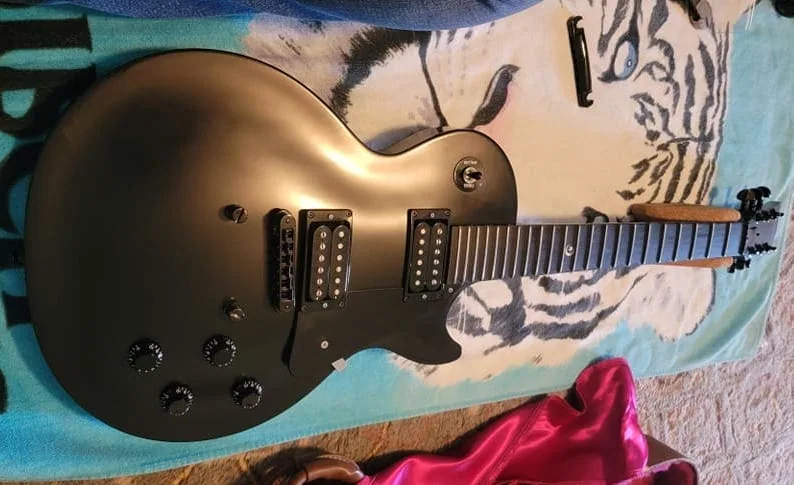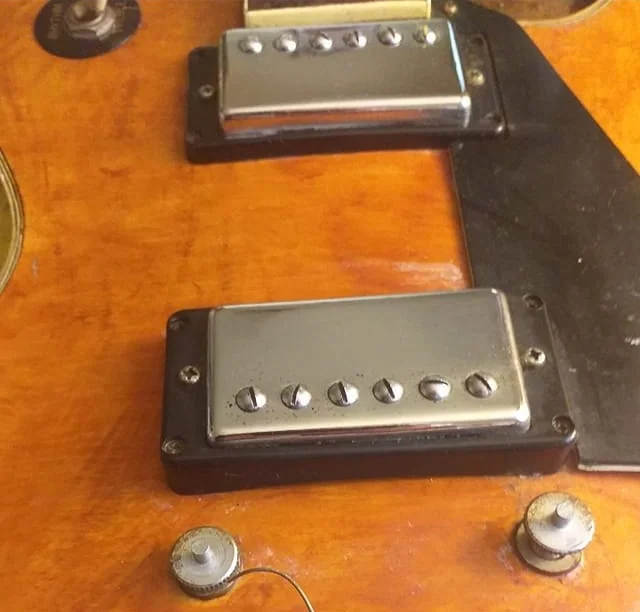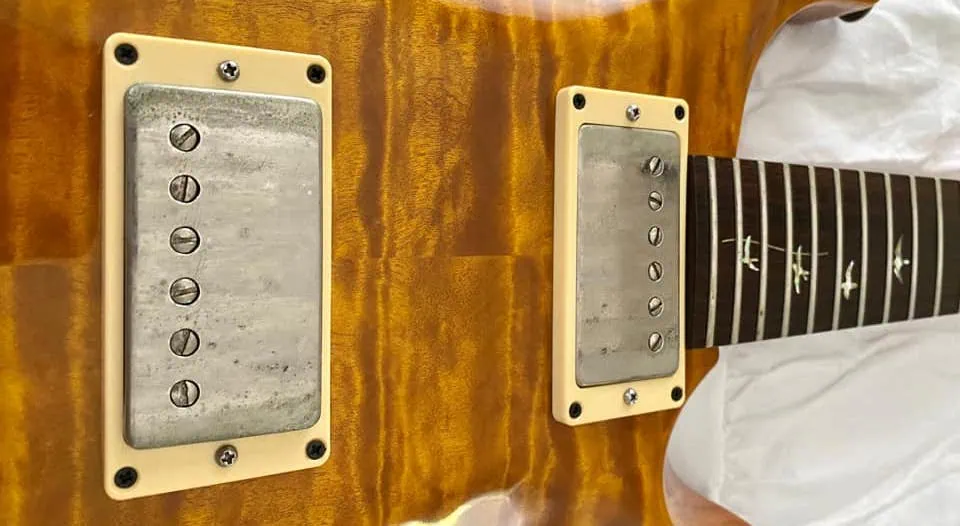You’ve put your favorite axe through the paces over the years. Those countless hours of picking and strumming have taken every bit of your blood, sweat, and tears. Literally. Well, perhaps not the blood, and hopefully not the tears. But chances are, there’s definitely some sweat that’s gone into it.
That sweat is likely to have caused some grime and possibly contributed to the build-up of rust on your pickups. That is over and above the dust that’s probably already accumulated there. Dirt, grime, and rust on your pickups can be unsightly and could affect the tone of your guitar.
It’s easy to remove dirt, grime, and rust from your guitar pickups. A few squirts of compressed air will blow out thick dust. And a little penetrating oil will remove unwanted surface rust. A simple white vinegar soak will make the rust disappear from your pole screws. You can apply a good guitar polish for additional protection.
For those who don’t know, pickups are those little box-like things on the body of your electric guitar. They sit under the strings, between the neck and the bridge. And they are integral to the production of sound from your instrument.
Most pickups are made up of an arrangement of small magnetic poles housed in a plastic bobbin. These poles are wound with conductive wire, which converts the vibrations of the strings into electrical current. That current is then sent through to the amplifier, which produces the sound you hear.
You can, therefore, guess why it would be essential to keep your pickups clean and clear of rust. While a minimal amount of rust won’t necessarily affect the functioning of the magnet, excessive rust could become an issue.
In this article, I will provide you with a step-by-step guide on keeping your pickups clean and rust-free. But, before I do, I’d like to highlight a few critical points.
Table of Contents
A Word of Caution
Keep Fluids and Liquids Away from the Electronics
First and foremost, do not allow any fluids or liquids to come into contact with the guitar’s electronics. If you get water into the pickups or other electrical components, you may damage them beyond repair.
Therefore, no matter what anyone says, do not use soap and water to clean your guitar. Similarly, I do not recommend using lemon juice and salt to remove rust from your pickup poles.
Be Cautious When Working with Electrical Components
You should be extra careful when working with the electrical components of your guitar. Be gentle with the wiring to avoid disconnecting anything important. And make sure that you don’t touch any live wires. Always remove the cable from the guitar, so it is unplugged when you work on it.
I’ve had my fair share of electrical shock from my amp and even my guitars when the electrical outlet that my amp was connected to wasn’t properly grounded.
Do Not Use Steel Wool on Your Pickups
Chances are that you’ve read some other information online regarding the removal of rust from your pickups. If so, you may have seen some people recommending the use of steel wool to scrub the rust off. However, I would like to urge you to not use steel wool on your guitar in this way.
Steel wool will leave tiny shavings of steel on your pickup poles. These shavings could also find their way onto the body of your instrument if you aren’t careful. They will get in everywhere and could end up scratching the guitar’s finish.
More importantly, though, you could inadvertently alter the polarity of your magnetic pickup poles by rubbing them with steel. A change in polarity could affect the functionality of your pickups and may even render them useless.
Don’t Bring a Magnet Near Your Pickups
This point is related to the steel wool issue mentioned above, but I feel it needs special mention.
There has been some discussion related to the problem with steel wool and the shavings left behind. Some have suggested that you should use a magnet to collect and remove the shavings after scrubbing. However, this is the worst thing you could possibly do to your pickup.
As mentioned, your pickup poles are magnetized to pick up the vibration of the strings. This is the first step in transforming your picking and strumming into actual sound.
But, if you run a magnet over the poles, you might change the polarity of the poles. Even one quick pass over them with a strong enough magnet could damage your pickups permanently and alter your tone in a bad way.
Cleaning Your Guitar or Bass Pickups

Before carrying out any sort of maintenance on your pickups, you must remove the strings first. If possible, try to coincide cleaning your pickups with when you replace your strings. This will save you a bit of hassle.
For the best results, I recommend detaching the pickguard and removing the pickups from the guitar. This way, you’ll reduce the risk of tarnishing the body, electrical elements, and other guitar components.
Remove the Pickguard and Pickups
When removing the pickguard, use a handheld precision screwdriver instead of a screwdriver drill bit. With a drill, you risk scratching the guard or finish on the guitar if you slip. You could also risk cracking the pickguard when tightening the screws if you make them too tight.
Be careful when detaching the pickguard, and don’t just lift it up off the guitar when unscrewed. Remember that a live cable and grounding wire is running from the jack. The claw is also earthing the bridge. So, tilt the pickguard up on one side slowly and gently, making sure not to pull any wires out.
When you have the pickguard in a safe position with the wires intact, unscrew the pickups to remove them. If your pickup has a cover over it, you should be able to remove the cover after unscrewing. Some plastic bobbin tops can also be unclipped and removed to expose more of the magnetic poles for cleaning.
If your pickup has a row of pole screws on it, carefully loosen the screws and remove them. Again, use a precision handheld screwdriver for this step. Take care not to strip the screws. And place them in a small container to avoid losing any of them. Note that some pole screws may need to be removed with an Allen or hex wrench.
Now, not all guitars and basses are the same. Some guitars don’t have pickguards at all, for instance. Nor are all pickups the same. Your guitar or bass may have single-coil, P90 or humbucker pickups. And the pickups may or may not have covers over them. Therefore, please use your discretion and adapt the process accordingly as I go through the steps below.
Dust Removal and Prevention
To remove existing dust from your pickups, you’ll need the following items:
- An aerosol can of compressed air with an extended nozzle (like this one on Amazon)
- A new, soft-bristled, dry paintbrush
- A clean and dry microfiber cloth
Using your soft-bristled paintbrush, lightly brush off any visible dust. Allow the bristles to get into any grooves and openings present, to remove surface dust from them.
Then, grab your can of compressed air and point the long, thin nozzle into any cracks and crevices. Give all these tight spots a good couple of squirts of compressed air to blow out the dust.
Brush the pickup again lightly with your paintbrush, and then wipe it down with the cloth. This should remove most, if not all, of the dust on the pickup.
Going forward, you can dust the pickup with your clean soft-bristled paintbrush without removing the strings. If you can do this after each session of playing, it would be optimal. I also recommend keeping your guitar in a bag or case to minimize the build-up of dust.
Cleaning the Faceplate

If your pickup has a metal faceplate over it, you may need to give that a clean too. Grime often accumulates on these, and they tend to lose their shine after a while. Faceplates are usually found on humbuckers and P90 pickups.
To clean your pickup faceplates and renew their shine, you will need the following:
- Good quality guitar polish (like Music Nomad Pro Strength Guitar Polish)
- Two clean and dry microfiber cloths
Place a little of the guitar polish on one of the microfiber cloths. Then rub the polish gently onto the faceplate in a circular motion. Let the polish sit for a few seconds. Then wipe off the excess polish and use your second clean cloth to buff the faceplate until it shines.
You can also rub a tiny bit of your guitar polish onto the pickups themselves. This can be done after dusting when you’ve put them back together. Follow the same process as you did with the faceplates. The polish will add a thin protective layer to the poles and screws to ward off rust.
However, if you are not using the Music Nomad Pro Strength Guitar Polish, be careful. Not all polishes or cleaning agents will not work on faceplates with a gold finish. Some compounds and cleaners may dull the gold and could damage the finish. If your faceplates are gold, look for a polish that’s made specifically for use on a gold finish.
Rust Removal and Prevention
Removing Rust from the Poles with Penetrating Oil
If you have a layer of rust on your pickup poles, don’t worry. You can remove the rust effortlessly. All you’ll need to get rid of that rust are the following items:
- Penetrating oil (such as WD-40)
- Masking or painter’s tape
- A small cotton swab or Q-tip
- Paper towel
- A clean, dry old toothbrush
- Small, shallow container (the lid of an old jar will do)
Using the masking or painter’s tape, cover the surface of the plastic bobbin around the magnetic poles. Cut the tape into thin strips and carefully stick them onto the bobbin so that only the poles are exposed. It takes a bit of work, but it’s necessary to prevent damage to the bobbins.
When working with penetrating oil, take care not to get any oil on any other guitar components. Penetrating oil could damage the finish of your guitar and cause problems with your electrics.
Once your bobbins are nicely covered and the poles exposed, it’s time to apply some penetrating oil.
Pour or spray a few drops worth of penetrating oil into your container. Then grab your cotton swab or Q-tip and dab it in the oil. Rub the oiled cotton swab on the first pickup pole in a circular motion. You may have to put in a little elbow grease. But you should see the rust lifting and discoloring the oil reasonably soon.
Use your paper towel to wipe the oil off the pickup pole and to lift any loose rust flakes present. Give the pole a light scrubbing with your old toothbrush to loosen any stubborn rust.
If you find you cannot remove all the rust after following the above steps, repeat the process. After that, move on to the remaining poles tackling them one at a time. When the rust has been removed to your satisfaction, and the poles have been wiped dry, remove the tape.
Removing Rust from the Pole Screws with Vinegar
To remove any rust from your pole screws, if you have them, you will need the following:
- White vinegar
- Shallow container
- Paper towel
Pour some of your white vinegar into your shallow container at a depth of approximately ¼ to ½ inch. Then place your rusted screws in the vinegar, ensuring they are submerged.
Leave the screws in the vinegar for about a day before checking on them. If the screws are still a little rusty, you can repeat the process using clean white vinegar.
Therefore, pour your rust-colored vinegar down the drain, preferably outside due to the pungent smell. Then pour fresh vinegar into the container at the same depth as before and place the screws into the container. Leave them for another day and then check on them again.
It usually only takes one vinegar soaking session to rid the screws of the rust unless they are heavily rusted. After two sessions, all the rust should be gone. At which point, you can dry the screws thoroughly with your paper towel.
Follow the same process for other rusted screws on your guitar. Such as the screws holding the bridge or pickguard in place.
Finishing with Polish
Polishing your pickup poles and pole screws is not essential. But I recommend doing it for an added layer of protection against potential rust. For this step, you will need the following elements:
- Good quality guitar polish (like Music Nomad Pro Strength Guitar Polish)
- Two clean and dry microfiber cloths
Make sure that your poles and pole screws are clean and dry before polishing.
Dab a tiny bit of polish onto one of the cloths and rub it onto each pole and pole screw. Allow the polish to sit for a few seconds.
Next, wipe the residue from the polish off the screws and poles. Then use your second clean, dry cloth to buff and shine the polished surfaces.
Once done, you are ready to reassemble your pickups and reattach your pickguard.
Note that getting the polish on the plastic bobbin is fine if you use Music Nomad Pro Strength Guitar Polish.
Reassemble When Done
Whether you are removing rust or just dusting, you can reassemble everything once you’re happy with the finished product.
Start by reassembling the pickup itself. Use the correct handheld screwdriver or hex wrench to screw any pole screws back into the pickup. Take care not to strip your screws. And make sure you reattach any plastic bobbin covers you may have removed. They should just clip back into place.
Next, you’ll need to screw the pickups back onto the pickguard as you found them. Remember to work gently and be careful not to pull any electrical wire connections apart under the pickguard.
Put the pickguard back in place and screw it in nice a snug. Don’t overdo it, though. If you tighten the screws too much, you may crack the pickguard or strip the screw.
The last thing left to do is restring your guitar. After which, you’ll have a guitar with shiny clean pickups to jam with.
In Conclusion
You don’t need a tech to clean or remove rust from your pickups. But you do need to work carefully and make sure you use the right tools and cleaning agents. The last thing you want to do is cause lasting damage to your pickups. They are vital to the operation of your guitar and the production of its sound.
Get into the habit of dusting your pickups with a clean paintbrush each time you play your guitar. Give them a good wipe down with a dry cloth every couple of weeks too. This will prevent the build-up of grime due to sweat, which could lead to rust. Then, each time you renew your strings, give those pickups a proper clean using the steps mentioned above.

